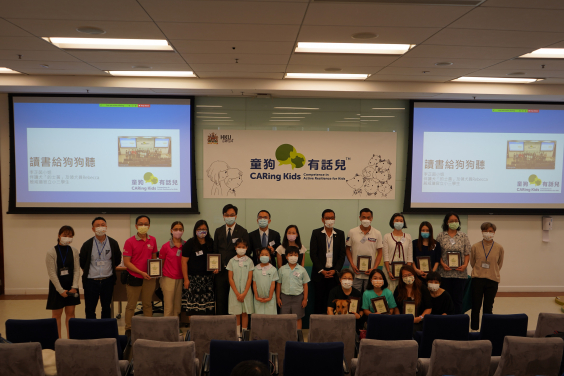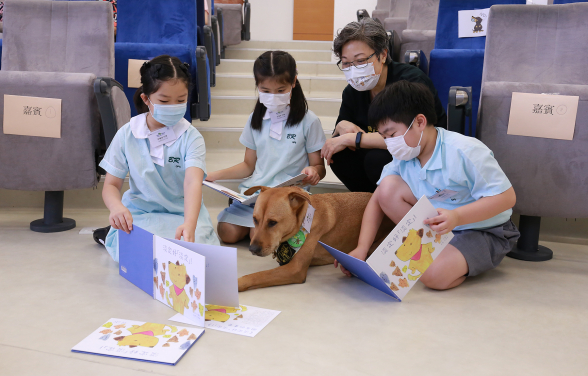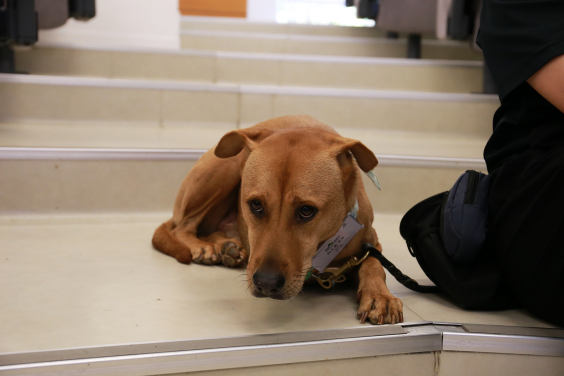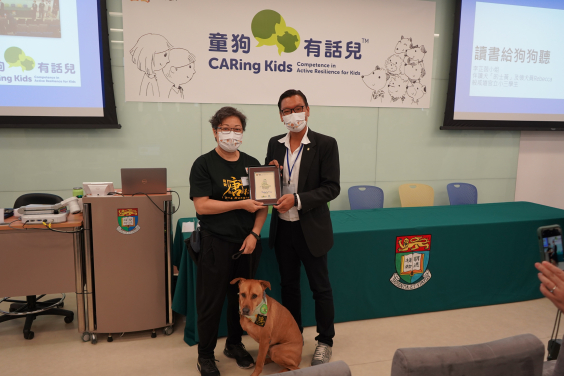Media
Animal-assisted humane education enhances social-emotional skills among primary school students in Hong Kong
17 Jun 2021
- 1 / 5
- 2 / 5
- 3 / 5
- 4 / 5
- 5 / 5
The Competence in Active Resilience for Kids (CARing Kids) research team released their preliminary findings on how the animal-assisted humane-education programme with reading canines enhanced cognitive-social-emotional skills of primary school students. The findings reveal that using trained canines in humane education enhanced students’ social-emotional skills and enabled them to become more empathetic towards others.
The CARing Kids programme was developed and led by Dr Paul Wong, an associate professor and clinical psychologist, and his team from the Department of Social Work and Social Administration, the University of Hong Kong (HKU). Working with animals in education settings is a very new concept and initiative in Hong Kong. No consensus has been reached among international educators on standards of best practice of such programmes, and the way of how people interact with dogs in Hong Kong is very different to other countries. Accordingly, the research team adopted an implementation science framework to carefully monitor and evaluate how this first-of-its-kind education programme with animals can be promoted and used as a routine humane education curriculum to be widely taught in Hong Kong.
Since late 2018, over 1,200 P.2 to P.3 students from 11 schools had joined the programme. The CARing Kids is a six-session animal-assisted humane education programme, normally competed within a semester. Its content includes different themes of social-emotional learning, for example, understanding the thoughts and feelings of self and others, the principles of social interaction, solving problems, and dealing with grief and loss. During the lessons, the students would learn through lecture, interactive games, and reading picture books to the trained reading canines. The seven storybooks were developed based on the real stories of the participating reading canines to enhance students’ learning motivation. Due to the unexpected challenges of the local and global situations since 2019, an online version of the CARing Kids was implemented when schools were locked down. The online version followed the six-session curriculum of the CARing Kids and the reading canines joined and accompanied the students to learn under the pandemic. Only the teaching platform was changed to online.
The press conference shared the qualitative findings gathered from students, parents, and teachers, who participated in focus groups and individual case studies that informed the research team what contextual factors had affected the implementation mechanisms and outcomes and how the involved individuals responded to and interact with our programme. The research team also presented quantitative findings of two pilot case-controlled studies about the post-intervention changes of cognitive-social-emotions of students who received the programme at schools and online when schools were in lockdown.
Key qualitative findings
The research team conducted focus groups and a longitudinal case study to explore the impact and mechanisms of the CARing Kids. More than 60 interviews and 1,500 minutes of audio records were collected and analysed. Nine students with diverse background were selected as the participants. Together with their parents, they were interviewed by the researcher three times throughout the semester. The researcher also interviewed their class teachers and reading canines’ handlers to further understand their process of change and the contextual factors that strengthen or hinder the development of social emotional competence. At the individual level, students commented that having the reading canine in the programme enhanced their self-discipline, anger management, and humane attitude. At the family level, some parents reported that their parent-child-sibling relationship were improved, students are more considerate and more willing to take care of younger siblings. At the school level, teachers reported that the programme enhanced students’ learning motivation, student relationships, and classroom learning atmosphere. More importantly, these changes were also observed in other classes. The results indicated that effective programme impact required the close cooperation among classroom, school and family. School devotion of promoting respect and supportive learning environment and positive parent-child interaction are essential for sustainability of programme impact.
For instances, a student reported that reading to the reading canines reduced loneliness and alleviated negative emotions. “I like the CARing Kids because of the companionship of the doggies. I feel like being protected by the doggies and my loneliness goes away, and I feel happier,” the student said.
A parent said that their family relationship has improved after the student tried the canine companion reading activities in CARing Kids. The storybooks provided opportunities for the student to connect with the family member as described. “My child had a problematic relationship with his father. However, after he tried reading the CARing Kids storybooks to his father, I found their relationship has improved. This birthday I brought two storybooks to him, and he started to read the story with me and his father," the parent said.
Some parents stated that their children applied the knowledge learnt in CARing Kids to help them overcome the fear of dogs. “I used to be petrified whenever I see a dog and experienced intense fear. My daughter taught me what I could do to interact with a dog. I am pleased that she shared that information with me. I also feel she is less irritated than before,” a parent said.
Finally, school teachers indicated that the students were more attentive and are more able to control their emotions because students looked forward to attending the Caring Kids and were more motivated to learn and apply the SEL skills learnt in school. “We are very attentive [in the CARing Kids]. Even classmates who were not so attentive in other lessons become very attentive in the CARing Kids…because they like the doggies very much,” a student said. Teachers also reported that the students were more involved in learning, willing to answer questions in class and more willing to complete their homework after the programme. “He is more involved in learning. He now raises his hand more frequently [to answer my questions] and less frequent in not handing in homework in time. And he is more willing to admit his mistakes,” the teacher said.
Key quantitative findings
Face-to-face teaching
A sequential mixed-methods formative evaluation was adopted in the pilot year of the programme. Controlled trial and focus groups were conducted to evaluate the preliminary outcomes and process of the programme and to identify the implementation obstacles and effective strategies. 110 primary three students from two primary schools participated in the study. They were enrolled into four class conditions (Condition 1: attend The CARing Kids with students from the same class [25 students]; Condition 2: receive school life education as a class [25 students]; Condition 3: receiving the CARing Kids with participants from other classes [30 students]; Condition 4: receiving extra-curriculum activities with participants from other classes [30 students]).
Among all four conditions, only participants in Condition 1 showed significant improvement in social-emotional skills after the programme in their (a) cognitive competence - the mean score increased from 20.6 to 23.4 (p =.02) indicating an increased trend to think deeper and learn more; (b) empathy - the mean score increased from 12.16 to 13.64 (p <.01) suggesting an enhanced willingness to see things from other peoples’ perspective; and (3) hyperactive behaviour – the mean score decreased from 14.6 to 12.8 (p =.02) showing that students were more stable and focused after the programme. The result is similar to social emotional programmes in other countries. More importantly, this study also demonstrated that the class condition acts as one of the factors in the implementation process which plays a role in affecting the programme outcomes.
Online teaching
During the school lockdown in the pandemic, many students’ psychological well-being was negatively impacted by the social distancing and school lockdown policies. To examine the process and outcomes of the CARing Kids online, another case-controlled study was conducted to compare the changes of students who joined the Caring Kids Online as the intervention group (n =35) and those who joined the normal school activities taught by the teachers as the control group (n = 32). All students and their parents completed the pre-and-post-intervention questionnaires. The results showed that the online version of the CARing Kids reduced students’ negative emotions, i.e., anxiety, anger, and hyperactivity, with a decrease in mean score from 8.17 to 6.40 (p < .01). Parents also reported that students’ hyperactive behaviour was reduced significantly with a reduction of the mean score from 16.2 to 14.7 (p =.01). The changes of the outcomes among the control groups were less pronounced. The results of this study indicated that the CARing Kids online can have a protective impact on the further development of poor negative psychological wellbeing when public health measures are implemented during the COVID-19.
In sum, the research team mentioned that as the first animal-assisted humane education programme in Hong Kong, it is very exciting that both quantitative and qualitative findings converged and suggest that using trained canines in humane education enhanced students’ social-emotional skills and enabled them to become more empathetic towards others. The team is pleased to see that students followed our curriculum design and brought the story books back home, read with their parents and explained to the parents what they had learned from our programme, which improved parent-child relationships. With the full support from the teachers and schools, our programme has compensated some of the shortcomings of the current education system, including an overemphasis on academic achievement and an underestimation of the significance of social–emotional competence and concern for environmental sustainability in Hong Kong. From the research perspective, adopting the implementation science offers the research team and educators in foreseeing how the CARing Kids will work in a much wider scope in the future. Further, the closely monitoring component of the research methodology allowed us to observe the welfare of the reading canines and the students were carefully safeguarded in real life conditions when most of the young people and their families have limited opportunities to interact with canines. However, it is noteworthy that an increased acceptance of including animals in education and social services settings may attract individuals without proper training to attempt delivering animal-assisted interventions (AAI) and overlook the welfare of the trained animals. The research team and all of the collaborators strongly believe that “animals are not tools without pulses” and parents and professionals should not purchase or adopt animals merely to improve young peoples’ well-being at the expense of the welfare of non-human beings. After all, “all human and non-human beings on the planet share only one world, and our health are intertwined”.
The way forward
The research team will hold an end-of-project webinar titled “The Past, Present, and Future of Animal-Assisted Interventions in Hong Kong and the Region” on June 19, 2021. The Keynote Speaker Professor Aubrey Fine, and several local AAI practitioners will share their thoughts and invaluable experiences on the current state of AAI on the global scene, consolidate local experiences in the engagement of animals in human services, share practice wisdom, raise awareness of animal welfare, and advocate for the sustainable development from a ‘One Welfare’ perspective. Details are as follows:
Date: June 19, 2021 (Saturday)
Time: 9:30 a.m. to 12:30 p.m.
The Zoom link for the webinar: https://hku.zoom.us/j/96080923187?pwd=Z0RURXdaVTBPVmhNSHJYbjVrWjNGQT09
About CARing Kids
The CARing Kids is a preventive intervention funded by the Keswick Foundation to tackle the issue of youth suicide in Hong Kong. The CARing Kids research team promotes the use of AAI in a crafted manner, advocates for the welfare of our trained animals in AAI, and promotes the concept of ‘One Welfare’ in the society. The ‘One Welfare’ concept postulates that human welfare, animal welfare, and environmental sustainability are interrelated. We hope the participants of the CARing Kids will consolidate and integrate the knowledge they have gained into their daily life and promote the concept of ‘One Welfare’ in the community for a sustainable future of Hong Kong.
Interested individuals can visit the CARing Kids website (https://www.aai.socialwork.hku.hk/) to understand more about the programme.
For more details about the CARing Kids, please contact Dr Paul Wong (Tel: 3917 5029 / 9819 0884; email: paulw@hku.hk) or Dr Rose Yu (Tel: 3917 5013; email: yuwaiman@hku.hk). For media enquiries, please contact HKU Communications and Public Affairs Office: Ms Melanie Wan (Tel: 2859 2600 / Email: melwkwan@hku.hk) or Ms Rashida Suffiad (Tel: 2857 8555 / Email: rsuffiad@hku.hk).





